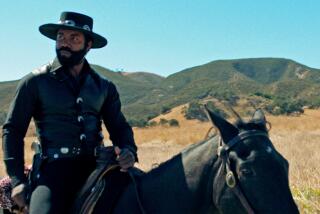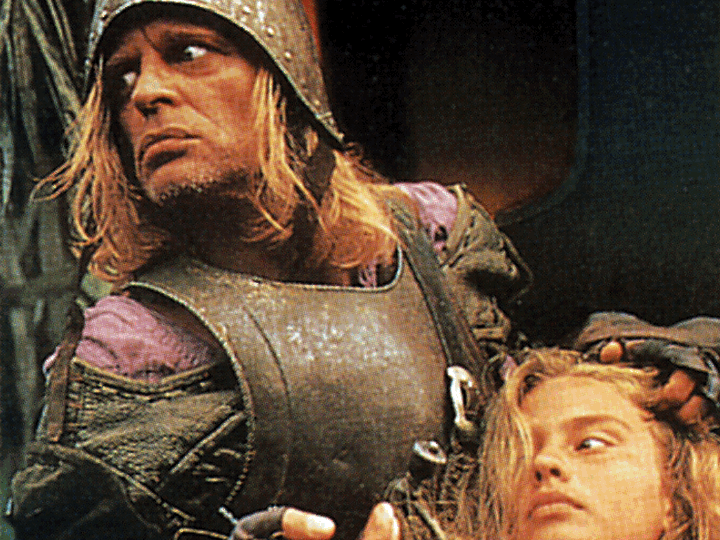Berserk for Billy Jack
- Share via
The America of 1971 was a place of deep divisions. A war dragged on in a far-off land, conservative values were pitted against the politics of personal freedoms and the youth were restless. It was against this backdrop that actor-writer-director Tom Laughlin tapped into the spirit of the times and unleashed “Billy Jack” -- a tale of one man’s fight to preserve justice for the young hippies and Native Americans attending a “freedom school” situated in an ultraconservative town.
Now, almost four decades later, a digitally remastered “Billy Jack” is set to screen Sunday night at the Billy Wilder Theater in Westwood as part of the Los Angeles Film Festival, followed by a conversation with Laughlin.
Though there had been plenty of lone-wolf heroes in cinema before the arrival of Laughlin’s titular character, few were so closely aligned with the counter-culture of the era. And though the movie had a hippie vibe, Billy Jack was no daisy-draped peacenik. First introduced in the 1967 biker exploitation classic “The Born Losers,” he was a troubled former Green Beret dressed in a black reservation hat and jeans jacket. He was skilled in the martial art of hapkido and was a crack shot with a rifle. And he wasn’t afraid to use excessive violence to protect his friends when they were hassled by local police and rednecks.
“Billy Jack’s” mixed message of violent pacifism confounded some critics, but that only underscored the moral ambiguity of the times -- and made for some entertaining fight sequences that predated the soon-to-be-popular Hong Kong martial arts movies.
Laughlin, now in his 70s and living in Moorpark, says that the characters and situations in “Billy Jack” came out of his personal experiences when he was courting his wife, Delores Taylor, who co-wrote and costarred with him in the film and sequels -- “The Trial of Billy Jack” and “Billy Jack Goes to Washington” -- in the small town of Winner, S.D., where he heard tales of discrimination, including one about service refused at a local store.
The incident inspired what is arguably the movie’s signature scene, in which a group of Native American students who attend the local “freedom school” are dusted with flour in an ice-cream shop, much to Billy Jack’s dismay. This provokes a soliloquy in which our hero tells the small-town racists that, even though he tries to follow the precepts of nonviolence, when he witnesses this kind of moral outrage, he has to take action. It’s here that he utters the film’s famous catchphrase, “I. . . just . . . go . . . BERSERK!” and proceeds to unleash his feet of fury and demolish the bad guys.
Laughlin, a Minnesota native who landed his first big role in Robert Altman’s 1957 film “The Delinquents,” notes that “everything in that movie, in one sense or another, came from real life.” Which, perhaps, explains the film’s popularity with youth and why it has maintained its cult status.
But getting “Billy Jack” into the theaters required almost the same kind of heroics that Laughlin’s character was performing on screen. After an initial release by Warner Bros., the film withered at the box office. Laughlin was later able to take the film back and embarked on a radically different way -- for the time -- of distributing a movie.
“In 1973, we eventually took control of the distribution doing whatever we could,” he said. “We’d go into a city and do radio and newspaper ads, and we’d rent a theater and put our own people in the box office. The rule back then was that a film had to open in a city’s downtown, and after the picture played out there it was moved to the upscale theaters, and after that the cheaper theaters and drive-ins.”
Under Laughlin’s guidance, “Billy Jack” eventually took in more than $40 million at a time when, Laughlin pointed out, “tickets only sold for 75 cents or a dollar.”
In the years since “Billy Jack’s” heyday, Laughlin has remained politically active and outspoken, running for president as an independent candidate in 1992, 2004 and 2008, as well as trying to get yet another “Billy Jack” movie off the ground. Currently titled “Billy Jack and Jean,” Laughlin promises it will update the character that made him famous and be “unlike any film ever made.”
--
More to Read
Only good movies
Get the Indie Focus newsletter, Mark Olsen's weekly guide to the world of cinema.
You may occasionally receive promotional content from the Los Angeles Times.









